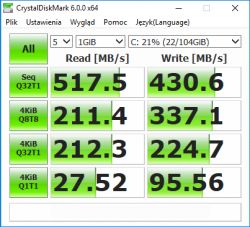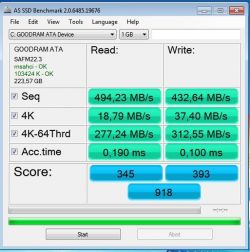Recently, a new SSD from GoodRAM appeared on sale - the IRDM model with a red logo on the housing. As I found only a few mentions about its premiere on the web, but no one has tested it anywhere, I did a few tests when the model fell into my hands.
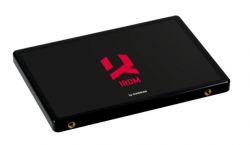
Compared to the well-known and often recommended Iridium PRO model, I noticed a few changes:
Phison PS3110-S10 controller (Iridium PRO) is listed on Phison PS3111-S11 (IRDM). Phison S10 is a quad-core, eight-channel controller, in the Iridium PRO drive a supported 1GB DDR3L cache. Phison S11 is a single-core, two-channel controller, it works without additional cache memory.
- Toshiba 19nm MLC (Iridium PRO) memories have been replaced with others, including MLC, but at the moment I have not found any information. The reference versions of drives with this controller in the MLC variant were seen with the Micron memories, but in principle IRDM can also be any other.
- The guarantee was shortened from 5 years (Iridium PRO) to 3 years (IRDM).
It would be unfair if I did not write that IRDM is much cheaper than Iridium PRO. I bought it in Sferisa for around PLN 330, where I would have to add PLN 50 for the Iridium PRO. Basically looking at the price it's hard to find a good SSD for this money.
To make it boring, I tested the new drive from 2018 with my SSD 840 PRO 128GB, who has been serving me for 5 years. At the moment he has 1,2004 running hours. IRDM had about 10% occupied space, Samsung about 60%. The IRDM drive was hooked up as an additional disk in my computer, Samsung was as systemic, so the test may not be fair, but it's not Samsung's results that are relevant. They are just for comparison, in the end 5 years is a big difference in age, the older disk should be far behind ... I guess It would be fairer to test a competitive 256GB model, but I only have 128GB, so it has to stay that way
It would be fairer to test a competitive 256GB model, but I only have 128GB, so it has to stay that way 
The equipment on which I am testing is based on the MSI Z97-G43 motherboard, which runs the Pentium G3258 processor with delicate OC to 4.6GHz. SATA drivers not very fresh, from Intel (although basically a standard Windows driver from MS worked very similarly).
In each test there will be three screenshots, from the left:
1) Samsung SSD 840 PRO 128GB - Rapid mode enabled
2) Samsung SSD 840 PRO 128GB - without Rapid mode
3) GoodRAM IRDM 240GB (IR-SSDPR-S25A-240)
As you can see, IRDM, despite the seemingly weak controller, does not have any bad performance (looking at the controller's specification I expected some massacre, and it did not work out badly here). I wonder what the performance of Iridium PRO looks like compared to this IRDM. If Iridium PRO falls into my hands I will do the same set of tests for comparison (the test would be done on the same machine, on the same settings, so this comparison would be quite reliable). Maybe these benchmarks will be useful to someone, as he will think about the cheap disk

Compared to the well-known and often recommended Iridium PRO model, I noticed a few changes:
Phison PS3110-S10 controller (Iridium PRO) is listed on Phison PS3111-S11 (IRDM). Phison S10 is a quad-core, eight-channel controller, in the Iridium PRO drive a supported 1GB DDR3L cache. Phison S11 is a single-core, two-channel controller, it works without additional cache memory.
- Toshiba 19nm MLC (Iridium PRO) memories have been replaced with others, including MLC, but at the moment I have not found any information. The reference versions of drives with this controller in the MLC variant were seen with the Micron memories, but in principle IRDM can also be any other.
- The guarantee was shortened from 5 years (Iridium PRO) to 3 years (IRDM).
It would be unfair if I did not write that IRDM is much cheaper than Iridium PRO. I bought it in Sferisa for around PLN 330, where I would have to add PLN 50 for the Iridium PRO. Basically looking at the price it's hard to find a good SSD for this money.
To make it boring, I tested the new drive from 2018 with my SSD 840 PRO 128GB, who has been serving me for 5 years. At the moment he has 1,2004 running hours. IRDM had about 10% occupied space, Samsung about 60%. The IRDM drive was hooked up as an additional disk in my computer, Samsung was as systemic, so the test may not be fair, but it's not Samsung's results that are relevant. They are just for comparison, in the end 5 years is a big difference in age, the older disk should be far behind ... I guess
The equipment on which I am testing is based on the MSI Z97-G43 motherboard, which runs the Pentium G3258 processor with delicate OC to 4.6GHz. SATA drivers not very fresh, from Intel (although basically a standard Windows driver from MS worked very similarly).
In each test there will be three screenshots, from the left:
1) Samsung SSD 840 PRO 128GB - Rapid mode enabled
2) Samsung SSD 840 PRO 128GB - without Rapid mode
3) GoodRAM IRDM 240GB (IR-SSDPR-S25A-240)
Spoiler:
Test # 1: ATTO Disk Benchmark , default settings.
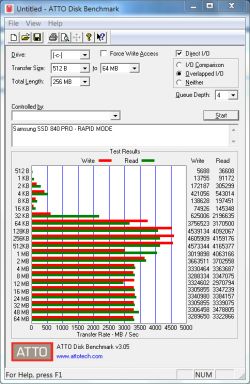
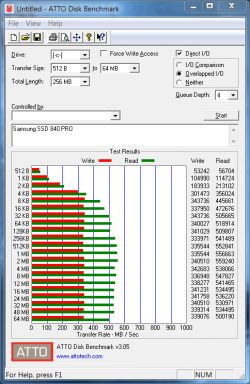
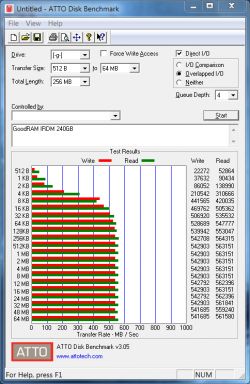
Test # 2: Crystal Disk Mark (above: on 1GB of data, lower on 4GB of data, average data of three tests)
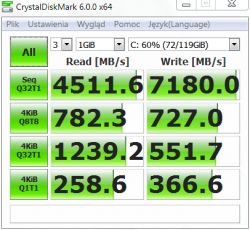
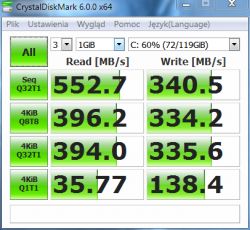
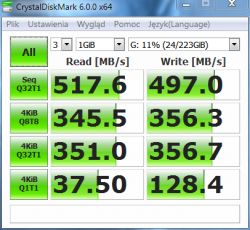
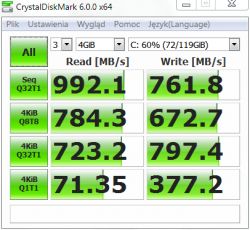
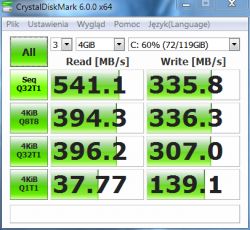
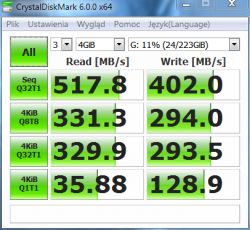
Test # 3: AS SSD Benchmark (above: on 1GB of data, less on 3GB of data)
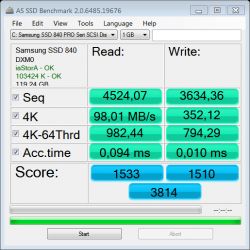
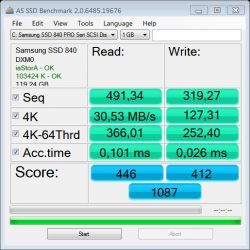
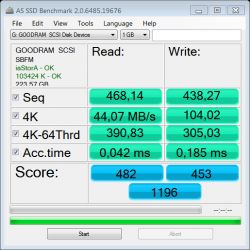
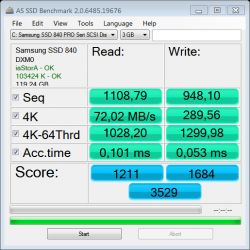
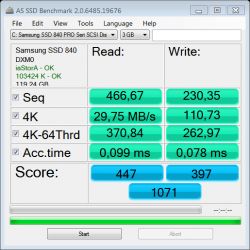
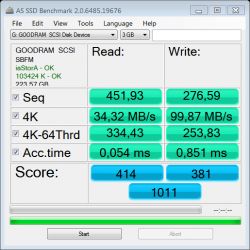
Test # 4: AS SSD IOPS (above: on 1GB of data, less on 3GB of data)
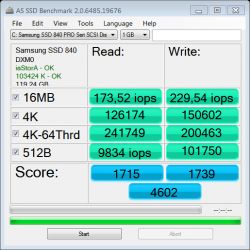
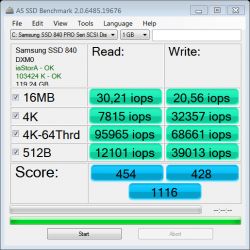
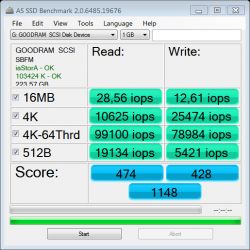

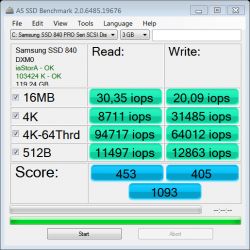
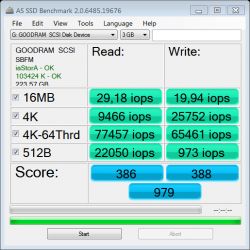
Test # 5: AS SSD Copy
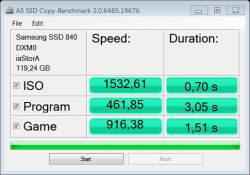
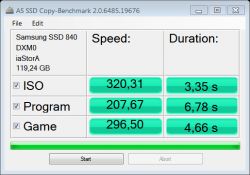
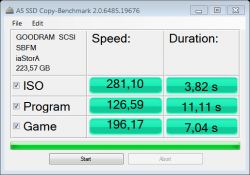



Test # 2: Crystal Disk Mark (above: on 1GB of data, lower on 4GB of data, average data of three tests)






Test # 3: AS SSD Benchmark (above: on 1GB of data, less on 3GB of data)






Test # 4: AS SSD IOPS (above: on 1GB of data, less on 3GB of data)






Test # 5: AS SSD Copy



As you can see, IRDM, despite the seemingly weak controller, does not have any bad performance (looking at the controller's specification I expected some massacre, and it did not work out badly here). I wonder what the performance of Iridium PRO looks like compared to this IRDM. If Iridium PRO falls into my hands I will do the same set of tests for comparison (the test would be done on the same machine, on the same settings, so this comparison would be quite reliable). Maybe these benchmarks will be useful to someone, as he will think about the cheap disk



